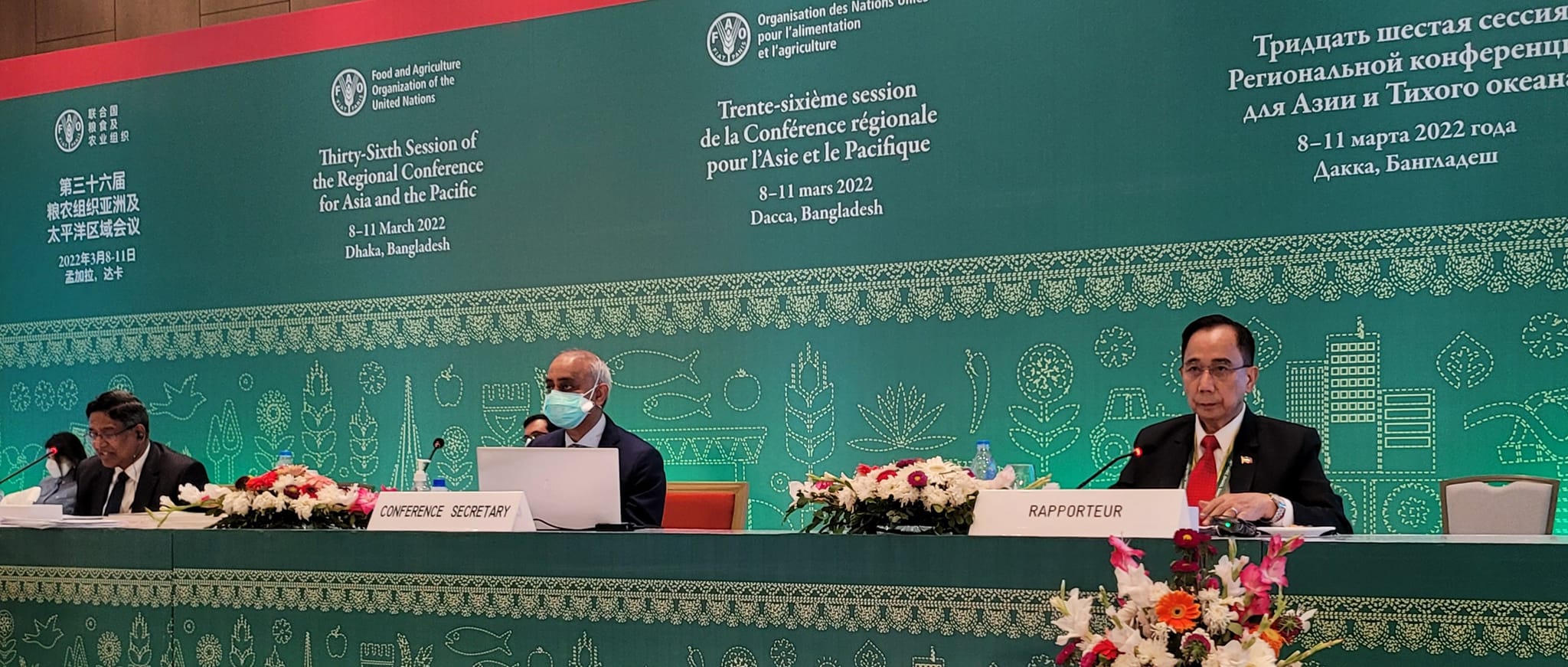
Dhaka, Bangladesh — Agriculture Secretary William Dar has called on his fellow agriculture ministers and senior officials of member-countries of the UN’s Food and Agriculture Organization of the United Nations (FAO) for a stronger collective response to curb the impact of the pandemic that has been aggravated by the effects of climate change.
“We must create efficient and resilient food production and delivery systems not only for today’s growing populations – but for future generations, as well,” said Secretary Dar at the plenary session of the 36th FAO Asia-Pacific Regional Conference (APRC), on March 8-11, 2022.
“The Philippine government holds that – at this historic moment, in the aftermath of an extraordinary global crisis – our shared success demands greater international collaboration, cooperation, and exchange,” he added.
The four-day regional conference formally commenced on March 10 with Prime Minister Sheikh Sahina of the People’s Republic of Bangladesh, as keynote speaker. It was attended physically and virtually by agriculture secretaries, ministers, and senior officials of 46 FAO member-countries in Asia and the Pacific.
Hosted by the Bangladesh Ministry of Agriculture, the conference serves as an avenue for discussions and sharing of initiatives to enhance the state of food and agriculture in the Asia Pacific region in light of the Covid-19 pandemic, and implement concerted actions to promote inclusive and climate-resilient agri-food systems, including the digitalization of agriculture and food value chains, among other mutual regional concerns.
Secretary Dar also called for an accelerated and collective response that is broad, science-based, inclusive, and innovative that would also meet the UN sustainable development goals by 2030.
In particular, for better production, he said FAO member-countries should prioritize “green innovation” to continuously develop resilient crop varieties, sturdy and productive livestock animals and fish species.
The DA chief also calls for further improvement in food safety regulations, and integration of sanitary and phytosanitary control measures and policies throughout the food value chain to ensure better nutrition and safe food for everyone.
In terms of environmental protection, he said FAO member-countries need to adapt to the effects of climate change, mitigate its impacts and undertake risk assessments. These would be most useful during typhoon season, drought, and other natural disasters.
For better life and poverty reduction, Secretary Dar said that it is imperative for member-countries to increase public and private investments in food systems, and in farm consolidation and clustering to increase efficiency and viability.
He also shared that the Philippines has successfully controlled the spread of the Covid-19 virus, but unfortunately has killed several thousands and affected millions of Filipino families. The impact of the pandemic was also aggravated by the effects of climate change, as water supplies are dwindling.
Nevertheless, he said that the Philippine government’s response to the pandemic and climate change has been elevated into a national policy, noting that “there is much to gain by building stronger food and agriculture supply chains.”
“We have made food security a defining national goal. Our immediate objective is to modernize our agriculture and fisheries systems, making them more efficient, inclusive, resilient, and sustainable,” he added.
In the process, the Philippine government is helping entrepreneurs create jobs, which in turn, provide greater economic security and equal opportunity, driven by education, digital technology, sustainable energy, innovation, and infrastructure.
Finally, he said the Duterte administration is continuously capacitating not only small farmers and fishers, but also women and the youth, who together play respective crucial roles in transforming the country’s agri-food systems towards competitiveness, resiliency, and sustainability. ### (Noel O. Reyes, DA StratComms)













